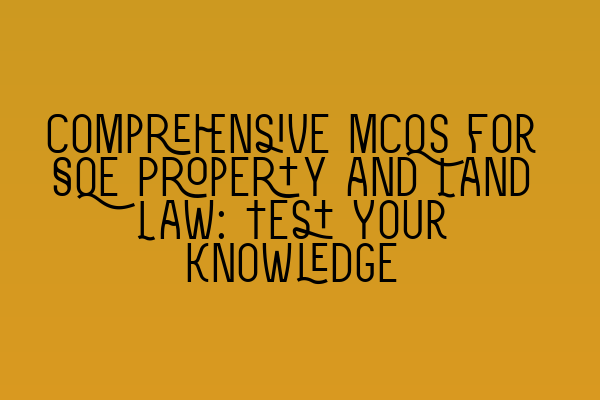Comprehensive MCQs for SQE Property and Land Law: Test Your Knowledge
Welcome to SQE Property Law & Land Law, where we provide expert guidance and support to aspiring solicitors in their journey towards success in the legal field. In this blog post, we will be focusing on comprehensive multiple-choice questions (MCQs) designed to test your knowledge of property and land law for the Solicitors Qualifying Examination (SQE). These questions cover key concepts and principles that you need to understand in order to excel in this area of legal practice.
Before we dive into the MCQs, let’s briefly discuss the importance of testing your knowledge. The SQE is a rigorous exam that assesses your ability to apply legal principles and knowledge to practical scenarios. By regularly testing yourself with MCQs, you can consolidate your understanding of the subject matter, identify areas of weakness, and improve your exam performance.
Now, without further ado, let’s begin with the MCQs:
1. True or False: Freehold and leasehold are the only two types of property ownership in English law.
A) True
B) False
2. Which of the following is considered a fixture in property law?
A) A bookshelf attached to the wall
B) A portable air conditioning unit
C) A potted plant sitting on the windowsill
D) All of the above
3. In what circumstances can adverse possession occur?
A) When a trespasser occupies land without the owner’s permission for a specified period of time
B) When a tenant with a lease occupies the property beyond the lease term
C) When the government seizes private land for public use
D) None of the above
4. When does a periodic tenancy arise?
A) When a tenant leases a property for a fixed term
B) When a tenant leases a property on a month-to-month basis
C) When a tenant occupies a property rent-free
D) None of the above
5. Which of the following is an example of a restrictive covenant?
A) A clause prohibiting the construction of additional buildings on a property
B) A clause requiring the property owner to maintain the premises in a certain condition
C) A clause allowing the property owner to access the land at any time
D) None of the above
6. True or False: Easements can be created by express agreement between the parties.
A) True
B) False
7. What is the purpose of the Land Registry in England and Wales?
A) To record and maintain a register of land ownership and interests
B) To enforce property rights through legal proceedings
C) To regulate property transactions and ensure fair prices
D) None of the above
8. Which of the following rights is considered an easement?
A) The right to cross someone else’s land to access a public road
B) The right to build a structure on someone else’s land
C) The right to exclude others from entering your property
D) None of the above
9. What is the purpose of a mortgage in property law?
A) To transfer ownership of the property from the borrower to the lender
B) To provide security for a loan by allowing the lender to take possession of the property if the borrower defaults
C) To prevent the property from being sold or transferred without the lender’s consent
D) None of the above
10. True or False: Joint tenancy and tenancy in common are two types of co-ownership in property law.
A) True
B) False
That concludes the MCQs for SQE Property and Land Law. We hope you found these questions challenging and useful for testing your knowledge. Remember, consistent practice and self-assessment are key to success in the SQE.
If you would like to delve deeper into the topics covered in these MCQs, we have a range of related articles that can provide you with additional insights and guidance:
– Understanding Contractual Capacity: Rights and Limitations: This article explores the concept of contractual capacity and the limitations surrounding it. [Link to the article](https://contract-law-sqe.co.uk/understanding-contractual-capacity-rights-and-limitations/)
– Interactive SQE Mock Tests for Contract Law: Test Your Knowledge: If you’re interested in practicing MCQs for contract law, this article offers interactive mock tests specifically tailored to SQE requirements. [Link to the article](https://contract-law-sqe.co.uk/interactive-sqe-mock-tests-for-contract-law-test-your-knowledge/)
– Join Our SQE Contract Law Webinars: Expert Insights and Guidance: Our webinars provide expert insights and guidance on various aspects of SQE contract law. Take advantage of these valuable resources to deepen your understanding of the subject. [Link to the article](https://contract-law-sqe.co.uk/join-our-sqe-contract-law-webinars-expert-insights-and-guidance/)
– SQE Prep: Mastering the Essentials of Contract Law: If you’re looking for comprehensive preparation materials for SQE contract law, this article offers essential resources to help you master the subject. [Link to the article](https://contract-law-sqe.co.uk/sqe-prep-mastering-the-essentials-of-contract-law/)
– Contractual Capacity: Understanding Legal Competence in Contracting Parties: This article further explores the concept of contractual capacity and its importance in the context of contracting parties. [Link to the article](https://contract-law-sqe.co.uk/contractual-capacity-understanding-legal-competence-in-contracting-parties-2/)
We hope these resources will enhance your understanding of property and land law, and contribute to your success in the SQE. Good luck with your studies and preparation!
